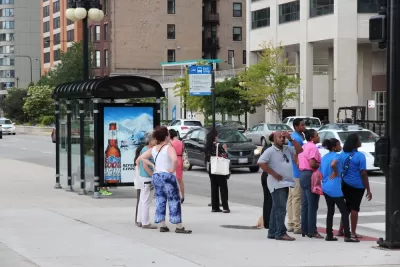Two companies focusing on hyper-local trips want to bring more transit and services within reach of Chicago’s underserved Black neighborhoods.

Two Black-owned Chicago companies want to use on-demand transportation to fill critical gaps in the city’s transit infrastructure. As Audrey F. Henderson writes in NextCity, Jitney EV and GEST are harking back to the informal jitneys that served Black residents when white cab companies often wouldn’t. Now, the two companies hope to bring electric, on-demand transportation to some of Chicago’s most underserved neighborhoods.
The services are not meant to compete with long-distance transportation to places like the city’s airports or suburbs. Rather, they’re designed to provide the short trips that many taxi and ride-hailing operators don’t want to make. “Their efforts are specifically targeting the ‘last mile’ gap between public transit stops and destinations such as grocery stores, banks and entertainment, along with providing an option for reliable transportation to and from work for residents within its service area,” said William “Billy” Davis, general manager for Jitney EV.
While it could be argued that more car-based services, even electric ones, could add to congestion, the companies argue that “Hyperlocal services could be a key factor in the ultimate goal of not only eliminating gasoline vehicles, but of reducing dependence on cars in the first place.” Meanwhile, free rides can connect more residents to jobs and essential services without the burden of transit costs.
FULL STORY: Black-Owned Companies Seek To Close Chicago’s Electric Transportation Gaps

Americans May Be Stuck — But Why?
Americans are moving a lot less than they once did, and that is a problem. While Yoni Applebaum, in his highly-publicized article Stuck, gets the reasons badly wrong, it's still important to ask: why are we moving so much less than before?

Using Old Oil and Gas Wells for Green Energy Storage
Penn State researchers have found that repurposing abandoned oil and gas wells for geothermal-assisted compressed-air energy storage can boost efficiency, reduce environmental risks, and support clean energy and job transitions.

Placekeeping: Setting a New Precedent for City Planners
How a preservation-based approach to redevelopment and urban design can prevent displacement and honor legacy communities.

San Francisco’s Muni Ridership Grew in 2024
The system saw its highest ridership since before the Covid-19 pandemic, but faces a severe budget shortage in the coming year.

Colorado Lawmakers Move to Protect BRT Funding
In the face of potential federal funding cuts, CDOT leaders reasserted their commitment to planned bus rapid transit projects.

Safe Streets Funding in Jeopardy
The Trump administration is specifically targeting bike infrastructure and other road safety projects in its funding cuts.
Urban Design for Planners 1: Software Tools
This six-course series explores essential urban design concepts using open source software and equips planners with the tools they need to participate fully in the urban design process.
Planning for Universal Design
Learn the tools for implementing Universal Design in planning regulations.
Heyer Gruel & Associates PA
City of Moreno Valley
Institute for Housing and Urban Development Studies (IHS)
City of Grandview
Harvard GSD Executive Education
Salt Lake City
NYU Wagner Graduate School of Public Service
City of Cambridge, Maryland




























